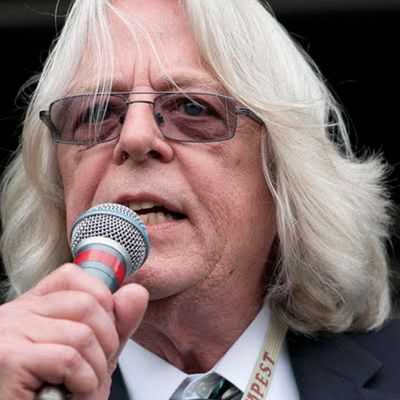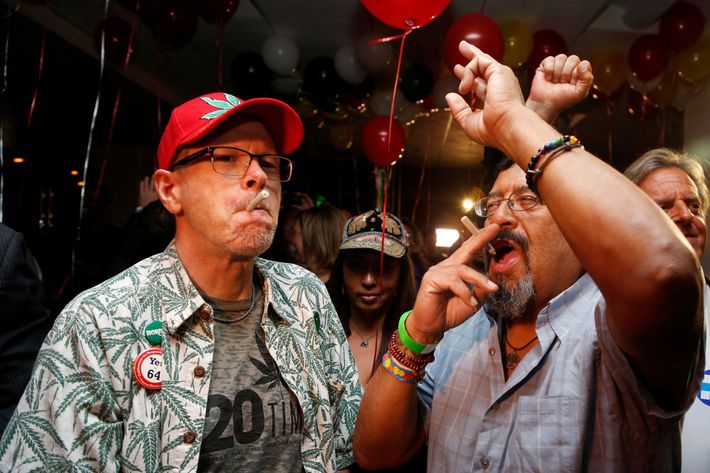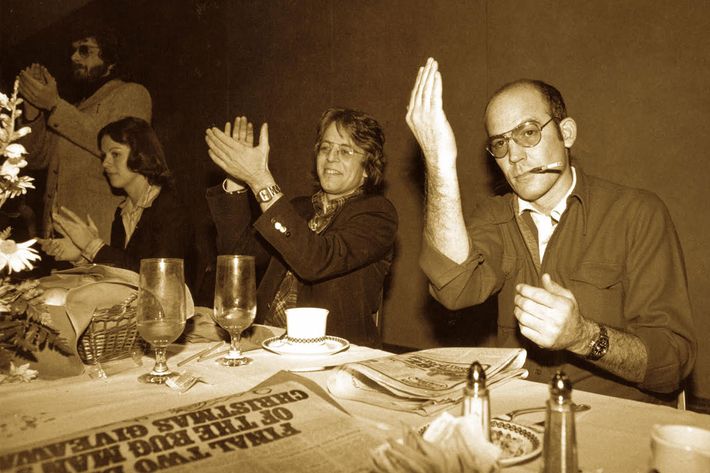
Yesterday, Americans handed over the keys to the White House to a thin-skinned demagogue, but in eight states, at least, they also voted to legalize a way to cope with the cataclysm they wrought.
Keith Stroup was glued to his television all night, smoking the sweet green as he watched the state returns. He was delighted, though it had nothing to do with Trump.
Stroup founded the National Organization for the Reform of Marijuana Laws (NORML) — the first nonprofit dedicated to decriminalizing cannabis across the United States — in 1970, and last night’s unprecedented ballot victories for pot put him that much closer to realizing a 46-year-old dream. Five states were voting on legalization of recreational marijuana — Arizona, California, Maine, Massachusetts, and Nevada — and four states were voting on medicinal use — Arkansas, Florida, Montana, and North Dakota. In the end, only Arizona held out, meaning marijuana will soon be legal in some form in 28 states and Washington, D.C. More than a fifth of Americans will be able to light a joint without a prescription.
Even Barack Obama acknowledged the significance of the initiatives. In an interview last week with Bill Maher, Obama said if the bills in all states passed — especially in California — then there would have to be a national conversation about federal marijuana-policy reform as the Justice Department, DEA, and FBI struggle to enforce laws that no longer apply to a growing portion of the country.
It’s the conversation that Stroup has been wanting to have for nearly five decades. We spoke with the 72-year-old marijuana activist as the final state initiative results trickled in.
How are you feeling about last night’s wins?
I think we won eight out of nine. My goodness, if you separate yourself from the presidential election, that’s an incredible victory.
Frankly, I don’t think we have to worry too much about the new administration and how they’re going to deal with marijuana because people have spoken pretty clearly around the country that they don’t like prohibition and they favor legalization. So I suppose in our little section of the world, we’re somewhat bulletproof with this administration. Now, it still makes me nervous because you’ve got the possibility of somebody like Rudy Giuliani being Attorney General, and he had a terrible record on marijuana policy when he was mayor of New York. I’m nervous that Governor Chris Christie could find a position in the new administration. I think he was the only Republican candidate who suggested he would shut down the legal states if he were elected president. But we had an enormous string of victories last night. Unprecedented.
The victories we had in 2012 in Colorado and Washington were the most strategically important, because at that point prohibition was in effect in all 50 states. But in terms of sheer political power, I think the statement that the voters made last night is by far the strongest pro-pot sentiment that we’ve ever heard in this country. When only 14 percent of the country are smokers, who you’re mostly hearing from are nonsmokers who are fed up with prohibition. So in that sense it was a wonderful night. But it was a little like, “Ms. Lincoln, other than that, how did you enjoy the play?”

Did you smoke to get through it?
I was smoking all evening when I was watching the returns, you can be sure. By then end, I poured the wine. Acting executive director Randy Quast came to my place and we lit up at about six o’clock when we started watching the early news. And of course I never stopped smoking until I finally passed out in bed.
How much have attitudes changed since you first started on this quest?
We founded NORML in 1970. In ‘69, Gallup did the first poll in which they even asked how many people favored legal marijuana. Before that they didn’t think it was serious enough to ask the question. Only 12 percent of the country was on our side at the time; 88 percent of the country was opposed to us. And the reason the environment is so different today is because over those last four and a half decades there’s been real turnaround in the public understanding of marijuana and its relative harmlessness. So now we have a handful of polls showing roughly 60 percent of the American public supports full legalization.
What led you to dedicate your career to this cause?
I started smoking later in life than many people who do smoke. It didn’t interest me. I was a farm boy raised in southern Illinois and I didn’t know much about this marijuana. So it was only when I came east to go to law school at Georgetown that I actually finally turned on to marijuana.
In fairness, it was my fear of the draft and being killed in Vietnam which radicalized me. After I graduated from law school, I got a critical-skills deferment by taking a job at a presidential commission, the National Commission on Product Safety. It was an outgrowth of the work that Ralph Nader had done. In addition to keeping me out of Vietnam it also turned me on to the concept of public interest. I had never heard of that. I presumed when you went to law school you graduated, you went back to your hometown, practiced law, got rich, and had a boring life. But once I was turned on to the idea that people like Nader would use their legal skills to impact policy rather than get rich or help their clients get rich, I was really enthralled by that concept. It gave me a purpose in life. As soon as the commission ended I had a choice as to what I wanted to do. So I got together with some friends and founded NORML as a product-interest lobby for responsible marijuana smokers.
When you’re that young, there’s a certain idealism that most of us had at that age, and a certain naïveté, I think both of which were crucial. If I would have realized what a large undertaking this really was, I doubt that I would have had the courage to start down that path.

Were you worried about tarnishing your legal career?
I had read a book by former Attorney General Ramsey Clark called Crime in America. I was amazed because here was this former Attorney General arguing that marijuana should be legalized. I’d never heard that from such a prominent public figure before. And so, at some point, when I was almost ready to announce NORML I began to feel a little trepidation. Like, man, I might be about to destroy my career and waste my law education. So I managed to get an appointment to see Ramsey and I wanted some reaffirmation that what I was doing made sense. And he was terrific. He not only said, “Yes, I think you should do it because it’s important and we need to end prohibition,” but also, “You should do it while you’re young because if you make a misstep and fall down you can pick yourself up and move on.”
Is it true that you couldn’t have done it without Hugh Hefner?
During one of those visits with Ramsey he asked if if I’d been in touch with the Playboy Foundation. Frankly, I didn’t even know there was a Playboy Foundation. But Ramsey had done this Playboy interview and developed a relationship with Hugh Hefner and he introduced me to the foundation. If I were making that decision today I think I probably would’ve looked in the other direction, but back then they were the only group that had shown any interest in funding us. I went out and had a meeting with Hefner and the other members of the foundation board. They got in touch with me within a few days and offered me $5,000 as their first funding. For the first decade of NORML’s life, Playboy was our major funder. Fairly quickly it was up to $100,000 a year.
Now that so many states have legalized, the federal government will almost certainly have to change their policies. How does it feel, looking back on the 46 years you’ve dedicated to the cause?
I feel fortunate to have lived long enough to have seen it. I was personally assured that it was going to happen because of the demographics. You could see that among the younger Americans, they really had no trouble with marijuana. It didn’t matter whether they smoked, but even if they didn’t themselves, they had friends who smoked or family members. It was just no big deal. So, for more young Americans, they just couldn’t figure out why it had ever been a crime. Our problem was with older Americans — my own contemporaries. I’m 72 years old and we lived through the “reefer madness” era when lots of older Americans believed the government lies and exaggerations about the dangers of marijuana. For decades, it was nearly impossible for a lot of older Americans to let go of that exaggerated view of marijuana. We used to laugh about this in the beginning. Our fallback political strategy was: If we can’t win it the usual way, we’ll win it by outliving our opponents. And to some degree I think that’s precisely what happened.
So, vindicated?
I thought I was right back in 1970. But it’s true, I didn’t have a lot of reinforcement back then. So, yes, it’s satisfying to see the public policy finally swing in the direction that we thought it should. But that’s the result of the involvement of tens of thousands of activists — not just me. I just happened to be the guy that came along at the right time. I was alienated by the war in Vietnam so I started an organization. But goodness, there are literally tens of thousands of people who have contributed to this and who will continue to because we’ve got a lot more work to do right now. We’ve still got a lot more states we’re going to flip.
What will you do when marijuana is finally legal across the country?
I’m going to try to enjoy my old age and smoke some really fine weed. You know, I tell people that I really am a proud marijuana smoker. I always have been. I think a lot of the challenge that we’ve had over these decades is that most marijuana smokers didn’t have the choice to come out of the closet because they would have lost their job and they couldn’t uproot their family. So the stereotype that a lot of older Americans had about marijuana smokers was based on the people on the fringes of society who were open marijuana smokers. I think it’s important for us to come out of the closet when we can and demonstrate that marijuana smokers are just average Americans who work hard and pay taxes and contribute in a positive way to our communities. People have nothing to fear from those of us who smoke marijuana. So I am certainly going to enjoy the finest marijuana in the world. And by the way, we grow the finest marijuana in the world right here in the U.S. of A., I’m proud to say.